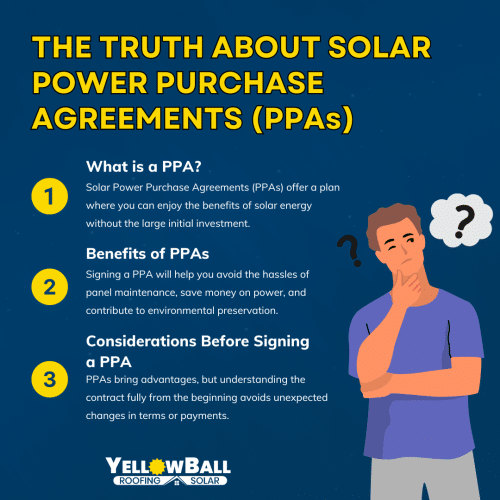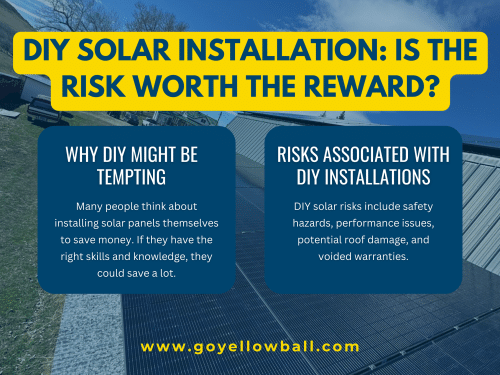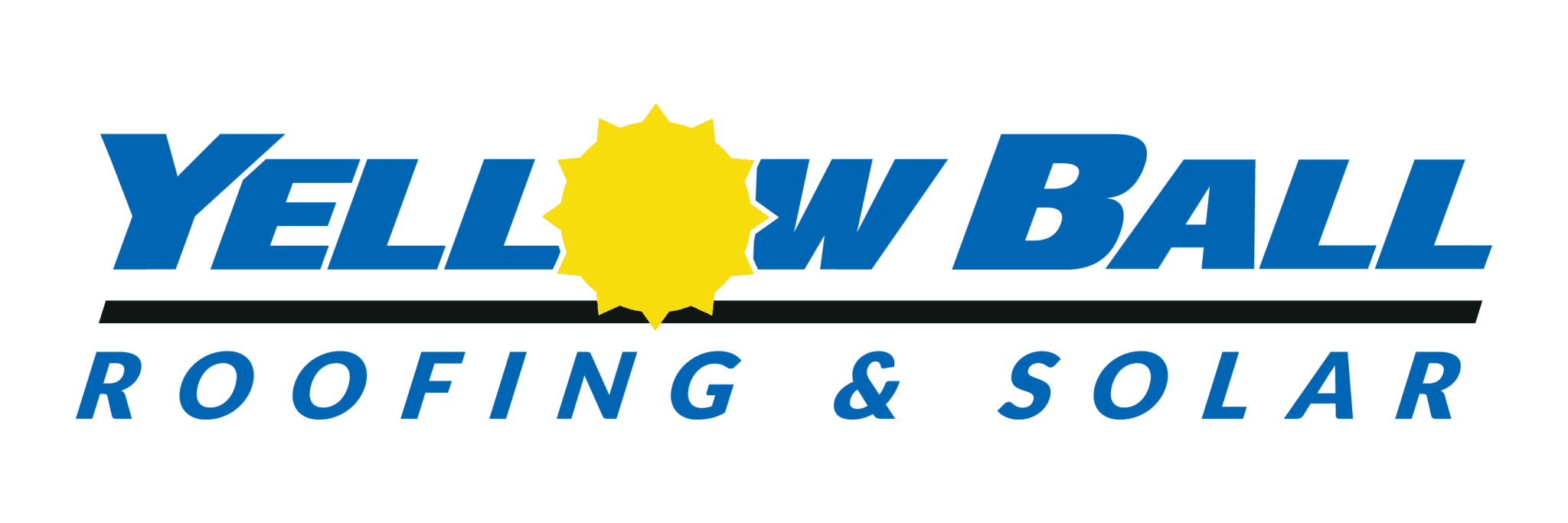Getting used solar panels for free is not just a fantasy; it’s possible. This guide will show you various ways to get these eco-friendly panels without spending a penny.
You’ll learn everything from attending government surplus sales to getting defective but usable panels directly from manufacturers.
You’ll also find out about financing options that make installing these panels affordable and discover how Power Purchase Agreements (PPAs) can let you enjoy solar energy without any initial investment.
By looking into government programs and understanding the true worth of second-hand panels, you can make smart choices about using solar energy for a sustainable future.
Ready to make your home a model of sustainability and efficiency? Contact YellowBall Roofing & Solar today and take the first step towards a greener, more cost-effective future.
Table Of Contents:
- Contacting Manufacturers for Defective Panels
- Financing Options for Solar Panel Installation
- The Truth About Solar Power Purchase Agreements (PPAs)
- Evaluating the True Cost of Used Solar Panels
- Exploring Government Offers & Incentives
- DIY Solar Installation: Is the Risk Worth the Reward?
- Alternative Solutions to Reduce Utility Bills Without Solar Panels
- FAQs about Used Solar Panels for Free
- Harnessing Solar Savings and Sustainability
Contacting Manufacturers for Defective Panels
One often overlooked method of getting free solar panels is contacting manufacturers directly. Sometimes, solar cell producers have panels that don’t meet their strict quality standards but are still functional.
These defective units can offer a viable solution for those looking to harness solar energy without the initial investment.
This approach requires persistence and timing, as not all companies will have surplus stock at any given time. However, securing these panels means you’re saving on costs and contributing to waste reduction by utilizing products that might otherwise be discarded.
Utilizing Online Platforms
Exploring the internet can lead to countless opportunities if you know how to use it effectively. Websites like Craigslist, Kijiji, and Freecycle are fantastic resources for finding free items, including solar panels.
Individuals or companies sometimes list used or unwanted solar equipment on these platforms, aiming simply to clear space rather than make a profit. Browsing these sites regularly can uncover fantastic deals on used solar panels for free.
Remember to inspect the condition of the panels carefully before installation, as they may require repairs or cleaning due to previous owners’ lack of maintenance.
It’s not widely known, but sometimes government highway departments give away damaged but usable panels from traffic signs or other installations through government surplus sales. This could be a way to get solar solutions for free.
Financing Options for Solar Panel Installation
Finding the right way to finance solar panel installation is complicated. With options ranging from loans to government incentives, understanding what’s available is vital.
Solar Loan
A solar loan offers a straightforward path to owning your system outright. Unlike conventional lending options, solar loans are tailored expressly to fund solar panel setups.
Solar power becomes more accessible by allowing homeowners to distribute the expense gradually. As you repay the loan, any savings on your electric bills start contributing directly back into your pocket.
One significant advantage of a solar loan is that it allows you to fully take advantage of tax credits and financial incentives without needing upfront cash.
Tax Credits and Financial Incentives
Using federal tax benefits can significantly lower the initial costs of installing solar panels.
For example, the Investment Tax Credit (ITC) lets you take 30% of the cost of installing a solar energy system from your federal taxes, and there’s no limit to how much you can deduct.
In addition to federal tax initiatives, some local governments offer extra incentives or rebates through utility companies or specialized programs to increase renewable energy adoption rates in their regions.
These incentives further lower the overall expense of transitioning to solar power, making it an environmentally friendly and financially smart choice.
If you are in Billings, MT, you can learn more about local rebates and incentive programs here.
The Truth About Solar Power Purchase Agreements (PPAs)
What is a PPA?
Solar Power Purchase Agreements (PPAs) offer a plan where you can enjoy the benefits of solar energy without the large initial investment.
 In this arrangement, a solar company installs panels on your property for free. Instead of buying the system outright, you agree to buy the electricity it produces at a lower rate.
In this arrangement, a solar company installs panels on your property for free. Instead of buying the system outright, you agree to buy the electricity it produces at a lower rate.
This model can greatly reduce your utility bills and offer cheaper electricity rates while avoiding the high installation costs. It’s a win-win situation when it comes to switching to renewable energy.
Benefits of PPAs
One major perk of entering into a PPA is avoiding maintenance responsibilities. Since the company technically owns the system, it handles any repairs or maintenance.
Therefore, signing a PPA will help you avoid the hassles of panel maintenance, save money on power, and contribute to environmental preservation.
Apart from being convenient, these agreements often result in lower utility costs over time. This is because you secure solar power rates that are less than the market rates as part of your agreement.
Considerations Before Signing a PPA
When entering a Power Purchase Agreement, it’s important to understand its length and possible changes in rates over time.
While PPAs can offer big benefits, knowing all the details from the start can help ensure there are no surprises later on about the contract’s length or changes in payments due to different energy production levels from season to season.
Evaluating the True Cost of Used Solar Panels
When investigating second-hand solar panels, it becomes clear that their real value extends beyond the initial financial investment.
Understanding the real value of getting and setting up these panels depends on a few important factors.
Testing and Repairs
An important consideration is the possibility that repairs and inspections may be required.
Used or surplus panels might not meet performance standards immediately, requiring additional investments to ensure they function correctly for your needs.
This step can significantly impact overall costs but is essential for achieving reliable solar energy production.
Finding a reputable technician specializing in solar panel assessment could help mitigate these risks by providing an accurate condition report before purchase.
Determining whether pre-owned solar panels will mesh well with your current setup or the place they’ll be installed is a crucial factor in their overall performance.
In some cases, upgrading may be necessary, which could increase the upfront expenses while ensuring optimal operation over time.
Navigating Financial Factors
Exploring renewable energy projects involves understanding financial incentives, which can help offset the initial costs.
Tax credits and government programs designed to promote sustainable practices make purchasing used solar equipment a financially viable option.
To truly benefit from solar power and support environmental sustainability goals, it’s crucial to evaluate the purchase price and all associated costs, including installation and compliance with regulations.
This comprehensive approach helps in assessing the long-term value of investing in clean technology, rather than focusing solely on the upfront cost.
Doing thorough research before deciding to invest in pre-owned photovoltaic cells instead of new ones can lead to significant savings and environmental benefits.
Exploring Government Offers & Incentives
Federal Tax Credits
Tapping into federal tax initiatives can lead to significant savings for those interested in solar energy.
The government recognizes the importance of sustainable energy solutions. To encourage homeowners and businesses to switch to solar power, it offers various financial incentives, including tax credits.
By leveraging these tax credits, the money you would have paid is directly reduced, easing the financial hit of installing solar panels. This means that when you install a new solar system on your property, these tax benefits cover part of your investment.
But remember, it’s essential to consult with a tax professional or use reliable online resources to understand how to maximize these opportunities based on your specific situation.
Local Utility Rebates
Beyond federal incentives, additional rebates may be available from your local utility company. Various utility companies have initiatives in place to encourage their clients to adopt renewable energy sources.
These rebates can further decrease the out-of-pocket expenses related to purchasing and installing new solar systems.
To discover what programs are available in your area, contact your local utility provider directly or visit their website. Browsing specialized websites that provide detailed rundowns of various incentives offered in diverse areas can also be beneficial.
In conclusion, exploring federal tax credits and local utility rebates presents two viable ways to reduce the overall costs associated with using solar power for residential or commercial purposes.
DIY Solar Installation: Is the Risk Worth the Reward?
Why DIY Might Be Tempting
Many people think about installing solar panels themselves to save money. If they have the right skills and knowledge, they could save a lot.
Plus, doing such a project can give them a feeling of achievement and control over their own energy sources.
 Risks Associated with DIY Installations
Risks Associated with DIY Installations
However, DIY installations come with their fair share of risks. Safety is the top priority; handling electrical systems and maintaining your roof requires knowledge to prevent accidents.
Moreover, incorrectly installed panels might not work efficiently or damage your home. Many manufacturers will also not validate warranties if panels aren’t professionally installed.
Getting permits can make things more complicated. Each town has its own rules for solar installations and requires checks to ensure they are followed.
Dealing with this paperwork by yourself can be hard and take a lot of time. In short, installing solar panels yourself might seem like a good way to save money at first.
You should consider whether the money you save is worth the risks of safety problems, losing warranties, and dealing with potential legal issues.
Tackling solar installation yourself can be daunting and risky. Leave it to the pros at YellowBall Roofing & Solar for a seamless, worry-free transition to green energy.
Alternative Solutions to Reduce Utility Bills Without Solar Panels
Cool Roofs Technology
While solar panels are a great way to create eco-friendly power and cut energy costs, they’re not the only cost-saving innovation out there.
Another innovative option is cool roof technology. This strategy involves changing or adjusting your roof so it reflects more of the sun’s rays and doesn’t absorb as much heat as a regular roof.
This strategy could keep your home cooler during hot periods, reducing the need for air conditioning and cutting energy costs.
Cool roofs use materials that reflect sunlight instead of absorbing it as heat. By naturally keeping buildings cooler, these roofs also reduce the urban heat island effect, which is good for community health.
To learn more about this idea and how you could use it on your property, you might want to visit the U.S Department of Energy’s page on cool roofs. There, you’ll find detailed information on how cool roofing works and practical advice on switching from traditional roofing materials.
FAQs about Used Solar Panels for Free
Is it worth buying used solar panels?
Yes, if they’re in good shape. You’ll save money upfront and still catch some rays for less.
Are old solar panels worth anything?
Absolutely. They can be sold or recycled for materials, making them valuable even past their prime.
Can I install used solar panels myself?
To Install solar panels, it requires expertise. Hiring a qualified installer familiar with used panels is safer and often more efficient.
How does net metering work with used solar panels?
Net metering programs credit you for excess energy produced. While used panels might generate less, you’ll still benefit from net metering if your system meets your needs.
Are used solar panels better than leasing?
Buying used panels gives you ownership and potential long-term savings compared to leasing, where you never own the system. However, upfront costs might be higher.
Harnessing Solar Savings and Sustainability
Getting used solar panels for free is not an impossible dream. Our guidance on various strategies, from obtaining discounts on government surplus to contacting manufacturers about slightly faulty panels, has given you the tools to purchase solar panels at a reasonable price.
Explore financial options and tax incentives to make solar energy accessible. Don’t overlook Power Purchase Agreements (PPAs) either; they’re a smart way to reduce your power bills without any upfront costs.
Tapping into government programs can sweeten the deal even more with extra incentives. And while getting these panels might feel like hitting the jackpot, always weigh their true cost against potential savings.
In short, solar energy is smart for your wallet, good for the planet, and – thanks to this guide – easier to get than you might think! Let’s cut down on electricity bills and brighten our beautiful Earth together!
Contact YellowBall Roofing & Solar for innovative solutions to make your home more energy-efficient. Your journey towards a sustainable home starts here.




